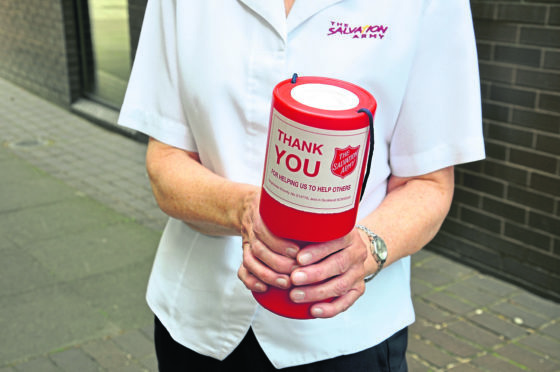A national charity has warned residents in the Western Isles to be vigilant after reports of people posing as doorstep collectors for good causes.
Half a dozen incidents in Marybank, just outside Stornoway, were reported to police, trading standards and the Salvation Army last week, claiming individuals were asking residents for bank details in the name of the charity.
Lieutenant Emma Newton of the Salvation Army centre in Stornoway spoke of the unfortunate incidents, saying: “Last week we had someone from the congregation visit someone in town saying that an individual came to their house last night collecting bank details. They didn’t want money and they thought this sounded odd so they rang us here at the Salvation Army and we told them to report it to the police on 101.
“In places there have been general charity collections, we had someone collecting bank details for the British Red Cross wearing a red tabard. It appears that someone took their chance and took this as their opportunity to ask for bank details on behalf of the Salvation Army.
“We know of about half a dozen cases who have got in touch with the Salvation Army reporting that someone had come to their door. In every case we are asking people to report this to the police.”
Collections made by the charity are not typically conducted in the form of house calls, but through street organised collection days.
No-one is believed to have been scammed as a result of the ploy but in a bid to prevent any potential future incidents, authorities are urging residents to be on their guard.
Several legitimate collectors for the Salvation Army are currently in operation selling their War Cry publication on the streets, alongside collectors from the British Red Cross and breast cancer charities.
A spokesman from Trading Standards said: “If a person feels under pressure or has any concerns at any time, they should contact Trading Standards on 01851 822 694, Police Scotland on 101 or Faire Community Careline on 01851 701702
“If you would prefer not to have such callers at your doorstep, we remind residents that Doorstoppers signage from the Doorstoppers Campaign can be printed off from the Comhairle’s website.”
A police spokesman added: “A number of reports have been received by police in the Western Isles about doorstep callers operating in the area on behalf of charitable organisations seeking to recruit direct debit donors.”
How to deal with doorstep house calls appropriately
Police in the Western Isles have issued advice for residents in dealing with doorstop callers.
Residents are being asked to be on their guard in dealing with bogus callers, rogue traders and doorstep criminals, in a bid to prevent them being scammed.
Despite doorstop collections being a legitimate practice, police have indicating a series of signals to help residents clarify if they are of true intent.
Firstly you should think about if you are expecting any visitors, only ever let the individual in if they have a prior appointment with you.
Security is also a factor to consider, ensuring all windows and doors are secure within the property at all times. Prior to opening the door, use either a door chain, a viewer or take a look out of the window to identify who the individual is.
To ensure the person is who they claim to be, ask to see the caller’s identification badge and authorisation or call the organisation they claim to be from to ensure the business are aware of the individuals presence in the community.
Residents should never feel pressured to let anyone gain entry to their home if they do not wish to be there, so if unsure, they are advised to simply not answer the door.
A police spokesman said: “If you are suspicious of the behaviour displayed by the caller, or concerned by the manner in which they are trying to engage you, you can report this to Police by telephoning 101, or Trading Standards by telephoning 01851 822694.”
